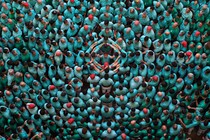Of Course AI Just Got a Nobel Prize
3 min read
When the Swedish inventor Alfred Nobel wrote his will in 1895, he designated funds to reward those who “have conferred the greatest benefit to humankind.” The resulting Nobel Prizes have since been awarded to the discoverers of penicillin, X-rays, and the structure of DNA—and, as of today, to two scientists who, decades ago, laid the foundations for modern artificial intelligence.
Today, John Hopfield and Geoffrey Hinton received the Nobel Prize in Physics for groundbreaking statistical methods that have advanced physics, chemistry, biology, and more. In the announcement, Ellen Moons, the chair of the Nobel Committee for Physics and a physicist at Karlstad University, celebrated the two laureates’ work, which used “fundamental concepts from statistical physics to design artificial neural networks” that can “find patterns in large data sets.” She mentioned applications of their research in astrophysics and medical diagnosis, as well as in daily technologies such as facial recognition and language translation. She even alluded to the changes and challenges that AI may bring in the future. But she did not mention ChatGPT, widespread automation and the resulting global economic upheaval or prosperity, or the possibility of eliminating all disease with AI, as tech executives are wont to do.
Hopfield’s and Hinton’s respective research did lay the groundwork for the generative-AI revolution that Google CEO Sundar Pichai has compared to the harnessing of fire. In 1982, Hopfield invented a way for computer programs to store and recall patterns, reminiscent of human memory, and three years later, Hinton devised a way for programs to detect patterns from a set of examples. Those two methods and subsequent advances enabled this century’s machine-learning revolution, which is built upon machines that detect, store, and reproduce statistical patterns from huge amounts of data, such as genetic sequences, weather forecasts, and internet text.
The Nobel committee focused its remarks on the foundational aspects of artificial neural networks: the ability to feed unfathomably large and complex amounts of data into an algorithm that will then, more or less undirected, detect previously unseen and consequential patterns in those data. As a result, drug discovery, neuroscience, renewable-energy research, and particle physics are fundamentally changing. Last year, a biomedical researcher at Harvard told me, “We can really make discoveries that would not be possible without the use of AI.” All sorts of nonchatbot algorithms across the internet, on social-media and e-commerce and media websites, use neural networks. In a presentation about today’s award, the theoretical physicist Anders Irbäck, another committee member, noted how these neural networks have been applied in astrophysics, materials science, climate modeling, and molecular biology.
Following the announcement, journalists were eager to ask about generative AI and ChatGPT, and Hinton—who has frequently voiced fears of an AI apocalypse—likened its influence to that of the Industrial Revolution. “We have no experience of what it’s like to have things smarter than us,” Hinton, who called into the ceremony, said. But the two committee members giving answers, Moons and Irbäck, demurred on questions about “GPT” and danced around Hinton’s doomerism.
Today’s award, in other words, should not feed the AI-hype cycle. It is a celebration of the ways in which machine-learning research “benefits all of humanity,” to borrow OpenAI’s phrase, in largely unseen, grounded ways that are no less important for that pragmatism. The prize should not be taken as a prediction of a science-fictional utopia or dystopia to come so much as a recognition of all the ways that AI has already changed the world.



